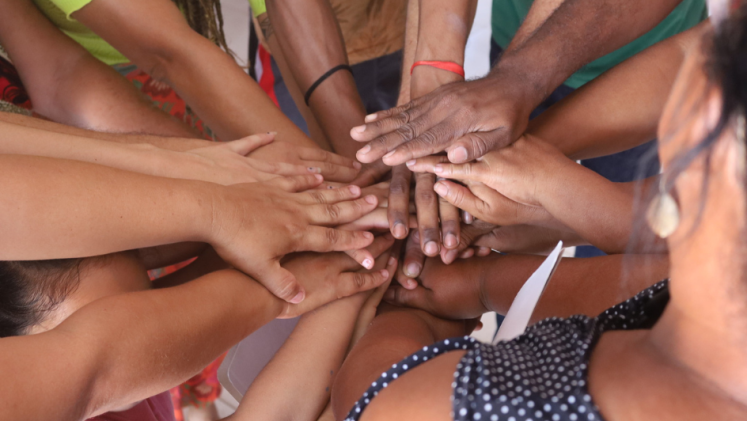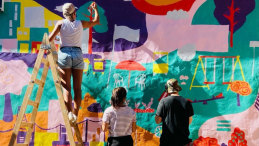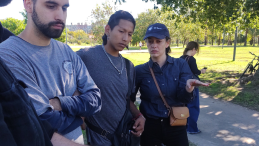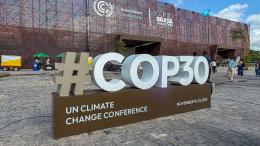Drawing from examples in Argentina, Mexico and Brazil, Guerra underscores the importance of community involvement, creative urban planning and environmental awareness.
The lessons learned are based on the Transformative Urban Coalitions (TUC) project, led by UNU-EHS and supported by the International Climate Initiative from the Germany's Federal Ministry of Economic Affairs and Climate Action. By examining these successful initiatives in Naucalpan (Mexico), Leon (Mexico), Teresina (Brazil), Recife (Brazil) and Buenos Aires (Argentina), Guerra calls for a holistic approach to urban transformation that can address contemporary challenges such as climate change, inequality and social cohesion.
Read the full op-ed in Spanish here. Please find the English translation below.
European and American practices, although effective in many aspects, are not always prepared to face the challenges of contemporary cities, especially in contexts of high inequality, limited resources and climate change. Latin America offers valuable lessons due to its experience in adapting to complex urban conditions and its ability to innovate with grassroots solutions. Its tradition that highlights community and cooperation is key in a world with growing distrust in institutions. A successful example are the Urban Labs of the Transformative Urban Coalitions (TUC) project, led by UNU-EHS. In less than three years, these labs, which have emerged as participatory models to address urban problems from their root causes, have achieved significant changes in streets and neighbourhoods, influencing the mindset of citizens and authorities, as well as public policies that affect urban life.
Through experiences in different locations in Argentina, Mexico and Brazil, these Urban Labs have accumulated at least five lessons that could guide urban transformation efforts around the world:
Promoting safe and trustworthy spaces for citizen participation
Active citizen participation is essential to drive transformation in cities. It is key to establish a neutral space for dialogue and collaboration between various sectors and stakeholders. Over time, this exchange of perspectives and knowledge often leads to shared learning and greater mutual trust. Naucalpan, the most industrialized municipality in the State of Mexico, has served as a meeting space for government officials and civil society, sectors that had not previously worked together. They have collaborated in defining a shared vision and action plan to solve local challenges, co-designing and implementing pilot projects and awareness-raising activities on green infrastructure, safe pedestrian environments, solid waste management and public transportation.
Localizing the climate agenda and co-creating context-based solutions
Climate change is rarely perceived as an urgent problem by the inhabitants of poorer urban areas, but it affects them enormously. It is imperative to raise awareness and work on the interrelations between the impacts of climate change, urban development and inequality issues in these communities. The Buenos Aires Urban Lab in Argentina has integrated climate action into pre-existing structures and processes in Villa 20, an informal settlement within the city of Buenos Aires undergoing a re-development process. This integration has made it possible to leverage political support and community participation to advance nature-based solutions. The case of Villa 20 has shown that by localizing the climate agenda and co-creating responses tailored to local needs, mental and political barriers can be overcome. This can help to generate greater awareness and commitment, governmental and in the community, and therefore local climate action.
Strengthening local capacities and empowering new leaders
Empowering communities to be agents of change is essential to entrust them to lead transformative initiatives in both the short and long term. From the Recife Urban Lab, in Brazil, in the Comunidade do Pilar, we learn the importance of promoting community leadership and female participation in transformation through capacity-building. The local cooperative Artesãs do Pilar emerged as a result of a training with more than 20 women in working with recycled materials, making artisanal products. The initiative has reduced the accumulation of waste on the street and has become a source of income, fostering a sense of community, sustainable practices and diverse skills in communication, organization and financial management.
Seizing opportunities to generate systemic impact
For transformative initiatives to endure, it is essential to secure financial resources and seek opportunities to expand their impact. Teresina’s Urban Lab in Brazil has addressed challenges of the national social housing programme Minha Casa, Minha Vida at the Edgar Gayoso Residential Complex, such as lack of community participation, social and economic segregation, infrastructure issues and environmental concerns. The Lab’s participatory governance model, now also adopted by the national programme Periferia Viva, has not only fostered a more interconnected and committed community towards sustainability transformation in Teresina, but has also contributed to transforming public policy design. This model ensures the continuous and informed participation of communities in urban decision-making, promoting a more inclusive and sustainable approach to urban development.
Sharing experiences and learnings widely
Sharing the successes and learnings of the Labs is not only about passing on knowledge, but also about building bridges to global change. Transformative communication and more creative approaches enhance these efforts. In the Urban Lab of Leon, in Mexico, as in the other labs, sharing learnings has become a vital tool. Communication skills have allowed community concerns to be documented in a variety of ways, including through photographs and drone images. Through visits, exchanges with other cities, social media and participation in national and global events, TUC Labs are multiplying the impact of their initiatives, inspiring others to follow their examples and drive positive change in their own communities.
These five lessons offer a valuable roadmap to making our cities more resilient, inclusive and sustainable. By integrating climate action with participatory processes and empowering communities to be agents of transformation, cities can comprehensively and effectively address ecological, economic and social crises.





